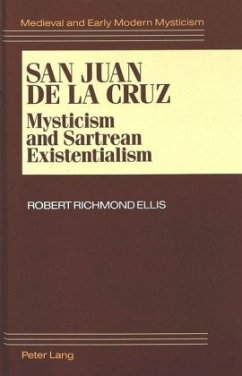In this iconoclastic book, Ellis submits the life and work of San Juan de la Cruz to the scrutiny of Sartrean analysis. In so doing, he clarifies the existential affinities that San Juan de la Cruz shares with other Golden Age Spanish writers as well as with the most significant exponents of western apophatism. The study asserts that apophatic mysticism, in contrast to the cataphatic theology of the scholastics, expresses in religious terms many of the fundamental intuitions of modern, secular, existentialism. In fact San Juan de la Cruz and Sartre both raise similar ontological questions. Notwithstanding, they make radically different choices regarding the existence of God.
"This study is a succinct presentation of St. John of the Cross's thought. Professor Ellis shows the thread of continuity in Spanish thought from Fernando de Rojas to Unamuno and Machado. At the heart of this interpretation is the 'Sanjuanist' mystical conception of nothingness which Ellis approaches from existentialist Sartrean philosophy. This is a suggestive exploration indeed." (José C. Nieto, Mary S. Geiger Professor of Religion and History, Juniata College)
"This extraordinarily broad yet penetrating study brings together the theological doctrine and the poetic vision of San Juan de la Cruz to show that he was a far more radical thinker than he is usually taken to be. The book is remarkably successful in its synchronic juxtaposition of sixteenth-century Catholic theology and twentieth-century atheistic existentialism and in its diachronic survey of the historical tension between mystical theology and the scholastic theology favored by Thomas Aquinas. It is also a significant contribution to our understanding of the complexities of negative theology in itself." (Hazel E. Barnes, Distinguished Professor of Philosophy, Emerita, University of Colorado at Boulder) "Highly recommended." (The Reader's Review)
"This extraordinarily broad yet penetrating study brings together the theological doctrine and the poetic vision of San Juan de la Cruz to show that he was a far more radical thinker than he is usually taken to be. The book is remarkably successful in its synchronic juxtaposition of sixteenth-century Catholic theology and twentieth-century atheistic existentialism and in its diachronic survey of the historical tension between mystical theology and the scholastic theology favored by Thomas Aquinas. It is also a significant contribution to our understanding of the complexities of negative theology in itself." (Hazel E. Barnes, Distinguished Professor of Philosophy, Emerita, University of Colorado at Boulder) "Highly recommended." (The Reader's Review)

